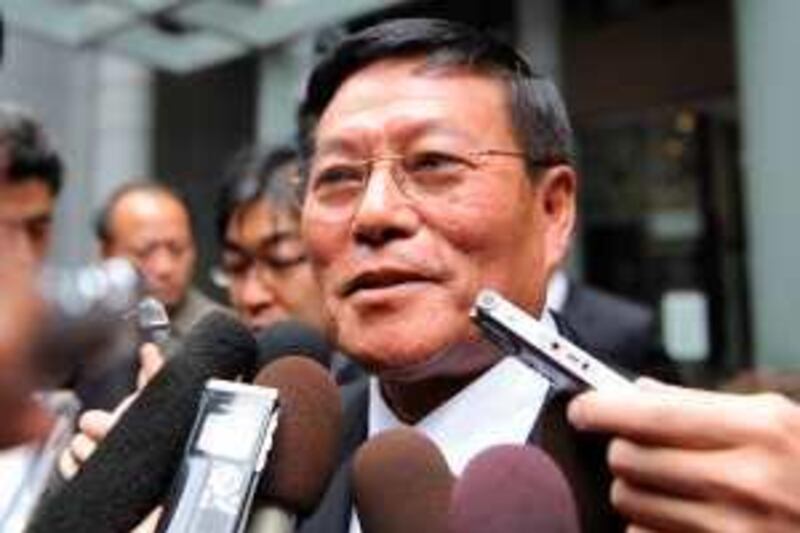BEIJING // Analysts are guarding against optimism about the outcome of the weekend meeting between the deputy representative of North Korea's nuclear negotiations with Sung Kim, the US special envoy to the six-party nuclear talks. Ri Gun had a one-hour meeting with Mr Kim at the US mission to the United Nations, but details were not known. "There are not a lot of high expectations that even such a meeting will lead to a breakthrough," Bruce Klingner, a former CIA analyst on North Korea who is now a senior research fellow at the Heritage Foundation, said. "What they're doing is to explore each other's positions.
"The US will probe to see if North Korea will fall off some of its preconditions." North Korea said it would consider returning to the six-nation nuclear talks "depending on the progress it makes in the bilateral negotiation with the US". The Obama administration also has its preconditions in which the North should first firmly commit itself to go back to the multilateral negotiations and reaffirm its willingness for denuclearisation before sending Stephen Bosworth, Mr Obama's frontman on North Korea, for any bilateral negotiations.
So far, neither side has made any concessions. South Korea's Yonhap news agency yesterday said Mr Ri is likely to meet Mr Kim again in the next few days to fine-tune preparations for a visit to Pyongyang by Mr Bosworth. Mr Ri is scheduled to attend the Northeast Asia Cooperative Dialogue in San Diego, California, today and tomorrow. Meanwhile, North Korea is also reportedly pushing for a summit with South Korea. The South Korean government, under President Lee Myung-bak, has reiterated that a summit is possible only when the North first commits itself for denuclearisation.
Last Wednesday, Hillary Clinton, the US secretary of state, also made the same point, saying the US will not lift sanctions on North Korea or normalise ties unless Pyongyang takes irreversible steps towards denuclearisation. In a speech at the US Institute of Peace, a think tank, Mrs Clinton said: "Current sanctions will not be relaxed until Pyongyang takes verifiable, irreversible steps toward complete denuclearisation." She warned that North Korean leaders "should be under no illusion" that the US will establish diplomatic relations with a nuclear-armed North Korea.
Analysts say, ultimately the negotiation with North Korea, then, hinges upon the fundamental question: will North Korea give up its nuclear weapons? Bonnie Glaser, a North Korea analyst at the Center for Strategic and International Studies in Washington, noted that even the North's renewed pledge to return to the stalled six-party talks is not enough and there still is a long way to go to accomplish the denuclearisation goal.
"I hope that if the North Koreans declare a willingness to return to the six-party talks that people won't break out the champagne. The question is whether North Korea will denuclearise, not whether it will return to the six-party talks," Ms Glaser said. "North Korea will never, in any circumstances, give up its nuclear weapons," said Zhang Liangui, a Chinese expert on North Korea at the Central Party School, an elite institute in Beijing for Communist Party cadre.
According to Mr Zhang, the reason that North Korea enters into a negotiation with the US is only to gain some practical benefits, not because it is considering renouncing its nuclear weapons. "Even though the US will satisfy North Korea's various demands, the North will still never, never give up its nukes," said Mr Zhang. Koh Yu-hwan, an expert on North Korea at Seoul's Dongguk University, disagrees, saying North Korea's position on nuclear weapons is fluid. "It's not that clear cut. The Korea War [1950-53] ended with an armistice. Technically the war is not yet over. The North wants nuclear weapons as a deterrent against the US. So, if the US offers a security guarantee, pledges that it wouldn't try a 'regime change' and sign a peace treaty with North Korea, the goal of denuclearisation is still possible," Mr Koh said.
"That's a naive view," counters Mr Zhang, pointing out that the North's motivation to own nuclear weapons is multifarious. "Actually, Pyongyang has multiple reasons to develop nukes," he said. "North Korea publicly says it is developing nukes because of the US threat. But actually, North Korea has multiple reasons, including domestic needs, arms-race against its rival South Korea, to take upper hand in case of unification with South Korea, and also to raise its strategic position in the region, particularly against Japan.
"All these issues will not be solved by the US guaranteeing its security. Therefore, despite all kinds of security guarantees from the US, North Korea will never give up its nuclear weapons," Mr Zhang said. Mr Klingner said the task will be arduous. "Actually, there is very little optimism among US analysts that North Korea will actually give up its nuclear weapons," he said, adding this very rationale is pushing the Obama administration to implement a 'two-track' approach on North Korea, which is designed to maintain pressure on Pyongyang, but also leave a door open for negotiation.
"Nothing can guarantee to get North Koreans to give up their nuclear weapons. But the two-track policy, I think, at least provides the best opportunity to achieve that," Mr Klingner said, adding there is no disagreement on this posture among its allies, South Korea and Japan. @Email:foreign.desk@thenational.ae





